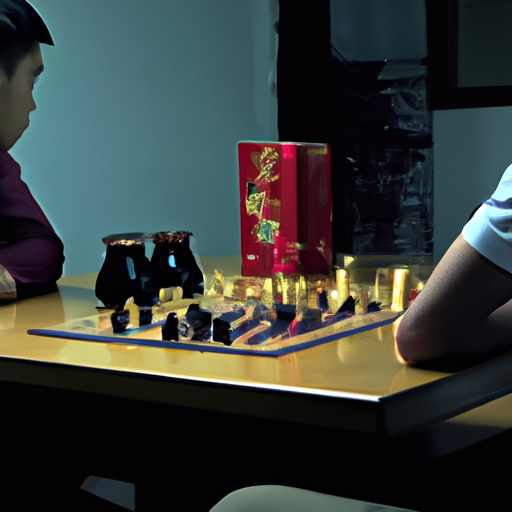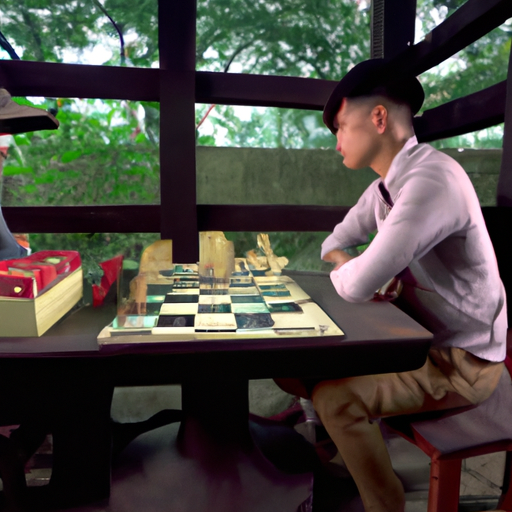Visa woes cause Philippine chessers to miss Eastern Asian Youth tilt in China

The Impact of Visa Issues on Philippine Chess Players’ Participation in Eastern Asian Youth Tilt in China
Visa woes have once again plagued Philippine chess players, causing them to miss out on the highly anticipated Eastern Asian Youth Tilt in China. This unfortunate turn of events has left the chess community in the Philippines disappointed and frustrated, as the players had been eagerly preparing for this prestigious tournament.
The Eastern Asian Youth Tilt is a significant event in the chess world, attracting talented young players from various countries in the region. It provides a platform for these players to showcase their skills and compete against their peers in a highly competitive environment. For the Philippine chess players, this tournament represented an opportunity to gain valuable experience and test their abilities against some of the best young chess players in the region.
However, despite their enthusiasm and dedication, the Philippine chess players were unable to participate in the tournament due to visa issues. Obtaining visas for international travel has always been a challenge for Filipino citizens, and this incident highlights the ongoing struggles faced by athletes in the country.
The visa application process can be a lengthy and complicated one, requiring various documents and interviews. In the case of the chess players, it seems that there were delays and complications in the processing of their visa applications, ultimately resulting in their inability to travel to China for the tournament. This is a frustrating setback for the players, who had invested time and effort into their preparations.
The impact of these visa issues goes beyond the disappointment of the players themselves. It also reflects poorly on the country’s ability to support and facilitate the participation of its athletes in international events. The inability of the chess players to compete in the Eastern Asian Youth Tilt not only deprives them of an opportunity for growth and development but also hinders the country’s representation on the international stage.
Furthermore, this incident raises questions about the support and resources available to Filipino athletes. It is crucial for the government and sports organizations to address these visa issues and find solutions that will enable athletes to participate in international competitions without unnecessary hurdles. This includes streamlining the visa application process and providing the necessary support to ensure that athletes can focus on their training and performance.
In addition to the immediate impact on the players’ participation in the Eastern Asian Youth Tilt, the visa issues also have long-term consequences. The missed opportunity to compete against top-level players from other countries means that the Philippine chess players will miss out on valuable experience and exposure. This could potentially hinder their growth and development as chess players, as they will not have the chance to test their skills against a diverse range of opponents.
In conclusion, the visa issues faced by Philippine chess players have once again hindered their participation in an important international tournament. This incident highlights the ongoing challenges faced by Filipino athletes in obtaining visas for international travel. It is crucial for the government and sports organizations to address these issues and provide the necessary support to ensure that athletes can compete on the international stage without unnecessary hurdles. Only then can Filipino athletes fully realize their potential and contribute to the country’s sporting success.
Challenges Faced by Philippine Chessers in Obtaining Visas for International Tournaments

Visa woes have become a significant challenge for Philippine chess players, preventing them from participating in international tournaments. This issue was recently highlighted when a group of talented young chessers missed the Eastern Asian Youth tilt in China due to visa complications. The incident sheds light on the difficulties faced by Filipino chess players in obtaining visas for international competitions.
The Philippines has a rich chess tradition, with many talented players emerging from the country. These players have consistently showcased their skills and brought pride to the nation in various international tournaments. However, despite their talent and potential, they often face numerous obstacles when it comes to securing visas for these events.
One of the main reasons for the visa challenges is the stringent requirements imposed by foreign embassies. These requirements often include proof of financial stability, travel insurance, and a detailed itinerary. While these conditions are understandable, they can be particularly burdensome for young chess players who may not have the financial means to meet these demands.
Another factor contributing to the visa woes is the lack of support from the Philippine government. Unlike some countries that provide assistance to their athletes in obtaining visas, Filipino chess players are left to navigate the complex visa application process on their own. This lack of support puts them at a disadvantage and increases the likelihood of visa rejections.
Furthermore, the visa application process itself can be time-consuming and arduous. Chess players are required to gather various documents, including bank statements, proof of accommodation, and letters of invitation from tournament organizers. These documents must be submitted to the respective embassy, and the waiting period for visa approval can be lengthy. This delay often results in missed opportunities for Filipino chess players to compete in international tournaments.
The consequences of these visa challenges are far-reaching. Not only do the players miss out on valuable opportunities to showcase their skills and gain international exposure, but the country as a whole suffers from a lack of representation in these prestigious events. The absence of Filipino chess players in international competitions hinders the growth and development of the sport in the Philippines.
To address these challenges, it is crucial for the Philippine government to take a more proactive role in supporting its chess players. This can be done by establishing a dedicated department or committee that assists athletes in the visa application process. By providing guidance and financial support, the government can alleviate the burden on chess players and increase their chances of obtaining visas.
Additionally, the government should work towards establishing stronger diplomatic ties with countries hosting international chess tournaments. This can help streamline the visa application process and ensure that Filipino chess players are given fair consideration.
In conclusion, the visa woes faced by Philippine chess players have hindered their participation in international tournaments. The stringent requirements imposed by foreign embassies, lack of government support, and the time-consuming application process have all contributed to this issue. To overcome these challenges, it is imperative for the Philippine government to provide assistance and establish stronger diplomatic ties. By doing so, the country can ensure that its talented chess players have the opportunity to compete on the international stage and bring glory to the nation.
Exploring Solutions to Visa Problems Faced by Philippine Chess Players in Competitions Abroad
Visa woes have become a recurring problem for Philippine chess players, preventing them from participating in international competitions. The recent case of the Eastern Asian Youth tilt in China highlights the urgent need to explore solutions to this issue.
Competing in international chess tournaments is not only a matter of pride for these players but also an opportunity to showcase their skills and gain valuable experience. However, the visa application process has proven to be a major hurdle for many Filipino chessers, often resulting in missed opportunities.
One of the main reasons for these visa problems is the lack of support and guidance from the relevant authorities. Chess players, especially the younger ones, often struggle to navigate the complex visa application process on their own. This lack of assistance leaves them vulnerable to mistakes and delays, ultimately leading to missed competitions.
To address this issue, it is crucial for the Philippine Chess Federation and other relevant organizations to provide comprehensive support to players throughout the visa application process. This support should include guidance on the necessary documents, assistance in filling out forms, and timely submission of applications. By doing so, players can avoid unnecessary delays and increase their chances of obtaining visas in a timely manner.
Another solution to consider is establishing stronger diplomatic ties with countries hosting chess tournaments. Building relationships with the embassies and consulates of these countries can help streamline the visa application process for Filipino chess players. This could involve organizing meetings and discussions to address any concerns or issues that may arise during the application process. By fostering stronger diplomatic ties, the chances of obtaining visas in a timely manner can be significantly improved.
Furthermore, it is essential to raise awareness about the visa problems faced by Philippine chess players. By highlighting these issues in the media and engaging in public discourse, the public and relevant authorities can be made aware of the challenges faced by these athletes. This increased awareness can lead to greater support and resources being allocated to address the visa problems, ultimately benefiting the entire chess community.
In addition to these measures, it is important to explore the possibility of establishing a dedicated visa assistance program for chess players. This program could provide specialized support and guidance to players throughout the visa application process. By having a dedicated team of experts who understand the unique needs of chess players, the chances of obtaining visas in a timely manner can be significantly improved.
Lastly, it is crucial to advocate for the inclusion of chess in the list of recognized sports by immigration authorities. By officially recognizing chess as a sport, it would be easier for chess players to obtain visas for international competitions. This recognition would also help raise the profile of chess as a legitimate sport, leading to increased support and resources for the chess community.
In conclusion, the visa problems faced by Philippine chess players in international competitions are a significant obstacle that needs to be addressed urgently. By providing comprehensive support, establishing stronger diplomatic ties, raising awareness, establishing a dedicated visa assistance program, and advocating for the recognition of chess as a sport, solutions can be found to ensure that Filipino chess players can participate in international tournaments without hindrance. It is essential that all stakeholders come together to address this issue and provide the necessary support to these talented athletes.

